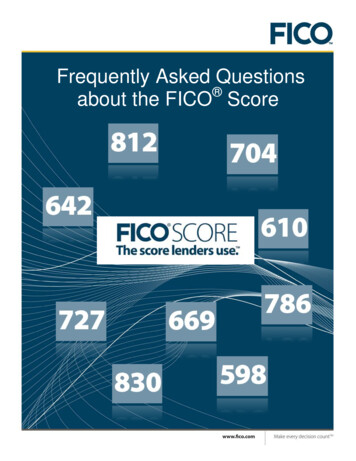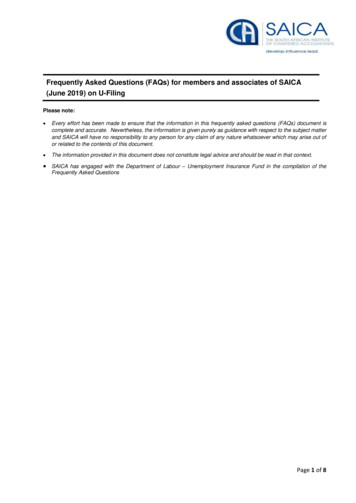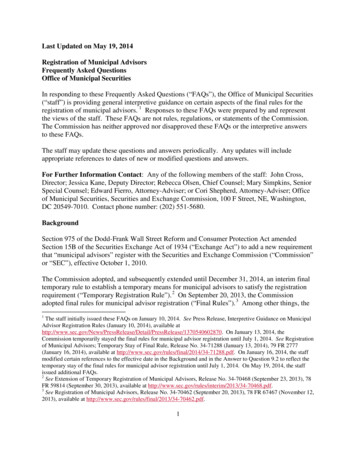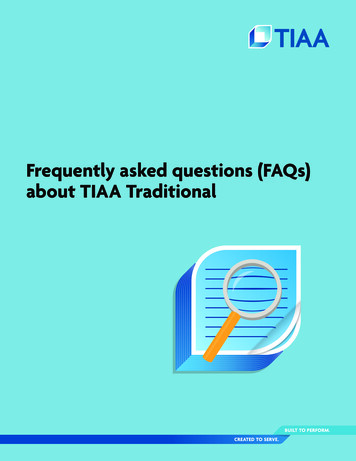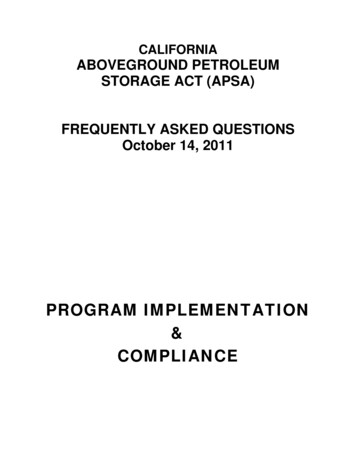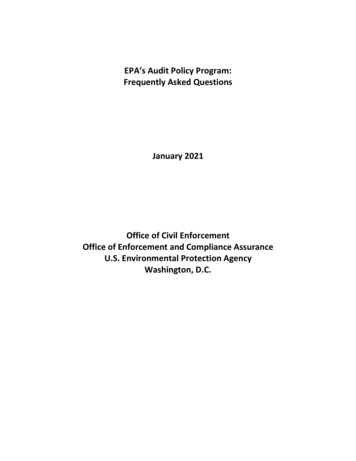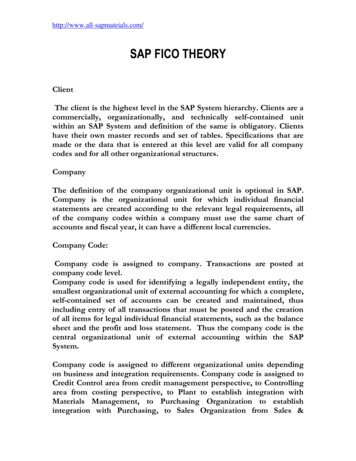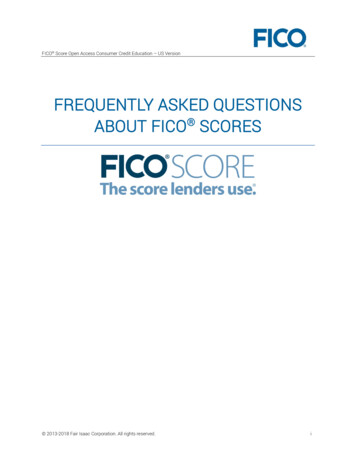
Transcription
FICO Score Open Access Consumer Credit Education – US VersionFICOFrequently Asked QuestionsFREQUENTLY ASKED QUESTIONSABOUT FICO SCORESFICOSCOREThe score lenders use: 2013-2018 Fair Isaac Corporation. All rights reserved.i
Frequently Asked Questions about FICO ScoresFICOTable of ContentsIntroduction to Credit Scoring . 1What is in a credit report?. 1How do I check my credit report for free?. 1What if there’s an error on my credit report? . 1What is a credit score? . 1About FICO Scores . 2What is FICO?. 2What are FICO Scores?. 2How are FICO Scores different?.2What goes into FICO Scores?.2What is left out of FICO Scores? .4What is a good FICO Score?.4What are score factors? .5What are the minimum requirements to calculate a FICO Score? .5How can FICO Scores help me? . 5Do I have more than one FICO Score? . 5Why is my FICO Score different than other scores I have seen? . 6Why do FICO Scores fluctuate/change? . 6New Credit . 6Does a FICO Score alone determine whether I get credit? . 6What is a typical FICO Score for someone new to credit? . 6How is a credit history established? . 6What is a credit “inquiry”? . 7Will my FICO Scores drop if I apply for new credit?. 7How can I minimize the effect to my FICO Score when seeking new credit? . 7Credit Cards. 8Should I take advantage of promotional credit card offers?. 8Will closing a credit card account affect a FICO Score?. 8What’s the best way to manage my growing credit card debt?. 8Student Loans. 8What is the effect of paying student loans while in college versus after graduation? . 8How are FICO Scores affected by the combination of interest and principal? . 9 2013-2018 Fair Isaac Corporation. All rights reserved.ii
Frequently Asked Questions about FICO ScoresFICODoes moving loans into forbearance affect FICO Scores?. 9Mortgages . 9How long will a foreclosure affect a FICO Score? . 9Are the alternatives to foreclosure any better as far as FICO Scores are concerned? . 9How do loan modifications affect a FICO Score? . 9How does refinancing affect my FICO Score? . 10Bankruptcy. 10How will a bankruptcy affect my FICO Scores?. 10More about FICO Scores & Financial Health . 10Do employers use FICO Scores in hiring decisions? . 10Are FICO Scores used in insurance underwriting? . 10Are FICO Scores unfair to minorities? . 10How are FICO Scores calculated for married couples?. 10How can I manage my credit and FICO Score responsibly?. 11What’s the ideal utilization ratio? . 11Will spending less and saving more affect a FICO Score? . 11Do accounts that are not on my credit reports affect my FICO Scores? . 11What are the factors of late payments, and how do they affect FICO Scores? . 12How long will negative information remain on my credit files? . 12Glossary of Credit Terms . 12Charge-off .12Collection .12Consumer Reporting Agency (CRA).12Credit account.13Credit file.13Credit history.13Credit limit .13Credit obligation .13Credit report .13Credit risk .13Credit score .13Default.13Delinquent .13Equal Credit Opportunity Act (ECOA).14Fair Credit Reporting Act (FCRA) .14 2013-2018 Fair Isaac Corporation. All rights reserved.iii
Frequently Asked Questions about FICO ScoresFICOFICO.14FICO Industry Score .14FICO Scores .14FICO Score NG.14Inquiry .14Installment debt.14Permissible purpose.14Revolving credit/debt.14Score factors .14Scoring model .15Utilization .15 2013-2018 Fair Isaac Corporation. All rights reserved.iv
Frequently Asked Questions about FICO ScoresFICOIntroduction to Credit ScoringWhen you apply for credit—such as a credit card, auto loan or mortgage—the company from which you areseeking credit checks your credit report from one or more of the three major consumer reporting agencies.In addition to your credit report, they will most likely use a credit score, such as a FICO Score, in theirevaluation of credit risk before lending their money to you.Each lender has its own process and policies for making decisions when reviewing a credit application.Most lenders consider a FICO Score along with additional information, either from one or more of yourcredit reports or from supplemental information you provide with your application, such as your income.What is in a credit report?Although each consumer reporting agency formats and reports this information differently, all creditreports contain basically the same categories of information. Identifying Information - Your name, address, Social Security number, date of birth and employmentinformation. This information is not used in calculating FICO Scores; it is only used to identify you.Updates to this information come from information you supply to your lenders.Credit Accounts - Most lenders report information about each account you have established withthem. They report the type of credit account, the date you opened the account, your credit limit or loanamount, the account balance, and your payment history.Credit Inquiries - Your credit reports list the inquiries that lenders have made for your credit reportswithin the last two years. When you apply for a loan, you authorize your lender to ask for a copy of yourcredit reports. This is how inquiries appear on your reports.Bankruptcies and Collections - Consumer reporting agencies also collect bankruptcy (often found inthe public record segment of a credit report) information from state and county courts, anddelinquencies reported by collection agencies.How do I check my credit report for free?You may get a free copy of your credit report from each of the three major consumer reporting agenciesannually. To request a copy of your credit report, please visit: www.annualcreditreport.com. Please noteyour free credit report will not include your FICO Score. Because your FICO Score is based on theinformation in your credit report, it is important to make sure that the credit report information is accurate.What if there’s an error on my credit report?If you find an error on one or more of your credit reports, contact the consumer reporting agency or theorganization that provided the information to the agency. Both parties are responsible for correctinginaccurate or incomplete information in your report as required by the Fair Credit Reporting Act.Equifax Disputes n)Experian Disputes nion Disputes redit)What is a credit score?A credit score is a number summarizing your credit risk, based on your credit data. A credit score helpslenders evaluate your credit profile and influences the credit that’s available to you, including loan andcredit card approvals, interest rates, credit limits and more. 2013-2018 Fair Isaac Corporation. All rights reserved.1
Frequently Asked Questions about FICO ScoresFICOAbout FICO ScoresWhat is FICO?FICO, formerly known as Fair Isaac Corporation, is the company that invented FICO Scores. Starting in the1950s, FICO sparked a revolution in credit risk assessment by pioneering credit risk scoring for creditgrantors. This new approach to measuring risk enabled banks, retailers and other businesses to improvetheir performance and to expand consumers’ access to credit. Today, FICO Scores are widely recognizedas the industry standard for measuring credit risk.It is important to note that while FICO works with the consumer reporting agencies to provide your FICO Scores, it does not have access to or store any of your personal data or determine the accuracy of theinformation in your credit file.What are FICO Scores?FICO Scores are the most widely used credit scores. Each FICO Score is a three-digit number calculatedfrom the data on your credit reports at the three major consumer reporting agencies—Experian,TransUnion and Equifax. Your FICO Scores predict how likely you are to pay back a credit obligation asagreed. Lenders use FICO Scores to help them quickly, consistently and objectively evaluate potentialborrowers’ credit risk.How are FICO Scores different?Not all credit scores are FICO Scores. Because FICO Scores are the credit scores most widely used bylenders—FICO Scores are used in over 90% of U.S. credit lending decisions 1—knowing your FICO Scoresis the best way to understand how potential lenders could evaluate your credit risk when you apply for aloan or credit. Other credit scores, which use scoring formulas different from FICO’s, may not give you anaccurate representation of the scores your lender uses when assessing your credit profile.What goes into FICO Scores?FICO Scores are calculated from the credit data in your credit report. This data is grouped into fivecategories; below is a detailed breakdown of the relative importance of each category. As you review thisinformation, keep in mind that: 1FICO Scores take into consideration all of these categories, not just one or two.The importance of any factor (piece of information) depends on the information in your entire creditreport.FICO Scores look only at the credit-related information on a credit report.FICO Scores consider both positive and negative information on a credit report.Mercator Advisory Group, Analysis, 2018 2013-2018 Fair Isaac Corporation. All rights reserved.2
Frequently Asked Questions about FICO ScoresFICO1. Payment History - Approximately 35% of a FICO Score is based on this information: Payment information on many types of accounts:o Credit cardso Retail accountso Installment loanso Finance company accountsBankruptcy and collection itemsDetails on late or missed payments (“delinquencies”), bankruptcies, and collection itemsNumber of accounts that show no late payments, or are currently paid as agreed2. The Amounts You Owe - Approximately 30% of a FICO Score is based on this information: Amount owed on all accountsAmount owed on different types of accountsBalances owed on certain types of accountsNumber of accounts which carry a balanceHow much of the total credit line is being used on revolving credit accountsHow much is still owed on installment loans, compared with the original loan amountsCredit utilization is one of the most important factors evaluated in this category, considers the amount youowe compared to how much credit you have available. While lenders determine how much credit they arewilling to provide, you control how much you use. FICO’s research shows that people using a highpercentage of their available credit limits are more likely to have trouble making some payments now or inthe near future, compared to people using a lower level of available credit.Having credit accounts with an outstanding balance does not necessarily mean you are a high-riskborrower with a low FICO Score. A long history of demonstrating consistent payments on credit accountsis a good way to show lenders you can responsibly manage additional credit.3. Length of Credit History - Approximately 15% of a FICO Score is based on this information:In general, a longer credit history will increase a FICO Score, all else being equal. However, even peoplewho have not been using credit long can get a good FICO Score, depending on what their credit reportsays about their payment history and amounts owed. Regarding length of history, a FICO Score takes intoaccount: How long credit accounts have been established. A FICO Score can consider the age of the oldestaccount, the age of the newest account and the average age of all accounts.How long specific credit accounts have been established.How long it has been since you used certain accounts.4. New Credit - Approximately 10% of a FICO Score is based on this information:FICO’s research shows that opening several credit accounts in a short period of time represents greaterrisk—especially for people who do not have a long credit history. In this category, a FICO Score takes intoaccount: How many new accounts have been opened.How long it has been since a new account was opened.How many recent requests for credit have been made, as indicated by inquiries to the consumerreporting agencies.Length of time since inquiries from credit applications were made by lenders.Whether there is a good recent credit history, following any past payment problems. 2013-2018 Fair Isaac Corporation. All rights reserved.3
Frequently Asked Questions about FICO ScoresFICOLooking for an auto, mortgage or student loan may cause multiple lenders to request your credit report,even though you are only looking for one loan. In general, FICO Scores compensate for this shoppingbehavior in the following ways: FICO Scores ignore auto, mortgage, and student loan inquiries made in the 30 days prior to scoring,so the inquiries won’t affect the scores of consumers who apply for a loan within 30 days.After 30 days, FICO Scores typically count inquiries of the same type (i.e., auto, mortgage or studentloan) that fall within a typical shopping period as just one inquiry when determining your score.5. Types of Credit in Use - Approximately 10% of a FICO Score is based on this information:FICO Scores consider the mix of credit cards, retail accounts, installment loans, finance companyaccounts and mortgage loans. It is not necessary to have one of each, and it is not a good idea to open acredit account you don’t intend to use. In this category, a FICO Score takes into account: What kinds of credit accounts are on the credit report? Whether there is experience with bothrevolving and installment accounts, or has the credit experience been limited to only one type?How many accounts of each type exist? A FICO Score also looks at the total number of accountsestablished. For different credit profiles, how many is too many will vary depending on the overallcredit picture.What is left out of FICO Scores?FICO Scores consider a wide range of information on a credit report. However, they do NOT consider: Race, color, religion, national origin, age, sex and marital statusSalary, or other employment information (however, lenders may consider this information separately)Where the consumer livesAny interest rate being charged on a credit card or other accountAny items reported as child/family support obligationsCertain types of inquiriesAny information not found in the credit reportWhat is a good FICO Score?FICO Scores generally range from 300 to 850, where higher scores demonstrate lower credit risk andlower scores demonstrate higher credit risk (note: some types of FICO Scores have a slightly broaderrange). What’s considered a “good” FICO Score varies, since each lender has its own standards forapproving credit applications, based on the level of risk it finds acceptable. So one lender may offer itslowest interest rates to people with FICO Scores above 730, while another may only offer it to people withFICO Scores above 760.The chart below provides a breakdown of ranges for FICO Scores found across the U.S. consumerpopulation. Again, each lender has its own credit risk standards, but this chart can serve as a general guideof what a FICO Score represents.Score range800 or HigherRatingExceptional740 to 799Very Good670 to 739Good What FICO Scores in this range meanWell above the average score of U.S. consumersDemonstrates to lenders that the consumer is an exceptional borrowerAbove the average of U.S. consumersDemonstrates to lenders that the consumer is a very dependable borrowerNear or slightly above the average of U.S. consumersMost lenders consider this a good score 2013-2018 Fair Isaac Corporation. All rights reserved.4
Frequently Asked Questions about FICO ScoresScore range580 to 669Lower than 580RatingFairPoor FICOWhat FICO Scores in this range meanBelow the average of U.S. consumersSome lenders will approve loans with this scoreWell below the average of U.S. consumersDemonstrates to lenders that the consumer is a risky borrowerFICO’s research shows that people with a high FICO Score tend to: Make all payments on time each monthKeep credit card balances lowApply for new credit only when neededEstablish a long credit historyWhat are score factors?Score factors are delivered with a consumer’s FICO Score, these are the top areas that affected thatconsumer’s FICO Scores. The order in which the score factors are listed is important. The first factorindicates the area that most affected the score and the second factor is the next most significantinfluence. Addressing these factors can benefit the score.What are the minimum requirements to calculate a FICO Score?A credit file must contain these minimum requirements (Note: The requirements vary slightly for FICO Scores NG): At least one account that has been open for six months or moreAt least one account that has been reported to the consumer reporting agency within the past sixmonthsNo indication of deceased on the credit file (if you shared an account with a person reported asdeceased, it is important to check your credit file to make sure you are not affected)How can FICO Scores help me?A FICO Score gives lenders a fast, objective and consistent estimate of your credit risk. Before the use ofcredit scoring, the credit granting process could be slow, inconsistent and unfairly biased. Keep in mindthat FICO Scores are only one of many factors lenders consider when making a credit decision. Here’show FICO Scores may benefit you.Get credit faster - FICO Scores can be delivered almost instantaneously, helping lenders speed up creditcard and loan approvals.Unbiased credit decisions - Factors such as your gender, race, religion, nationality and marital status arenot considered by FICO Scores. When a lender uses your FICO Score, they’re getting an evaluation ofyour credit history that is fair and objective.May save you money - A higher FICO Score can help you qualify for better rates from lenders—generally,the higher your score, the lower your interest rate and payments.More credit available - Because FICO Scores allow lenders to more accurately associate risk levels withindividual borrowers, they allow lenders to offer different prices to different borrowers. Rather than makingstrictly “yes-no” credit decisions and offering “one-size-fits-all” credit products, lenders use FICO Scores toapprove consumers who might have been declined credit in the past. Lenders are even able to providehigher-risk borrowers with credit that they are more likely to be able to manage.Do I have more than one FICO Score? 2013-2018 Fair Isaac Corporation. All rights reserved.5
Frequently Asked Questions about FICO ScoresFICOTo keep up with consumer trends and the evolving needs of lenders, FICO periodically updates its scoringmodel, resulting in new FICO Score versions being released to market every few years. Additionally,different lenders use different versions of FICO Scores when evaluating your credit. Auto lenders, forinstance, often use FICO Auto Scores, an industry-specific FICO Score version that’s been tailored totheir needs.Why is my FICO Score different than other scores I have seen?There are many different credit scores available to consumers and lenders. FICO Scores are the creditscores used by most lenders, and different lenders may use different versions of FICO Scores. Inaddition, FICO Scores are based on credit file data from a consumer reporting agency, so differences inyour credit files may create differences in your FICO Scores.Why do FICO Scores fluctuate/change?There are many reasons why a score may change. FICO Scores are calculated each time they arerequested, taking into consideration the information that is in your credit file from a consumer reportingagency at that time. So, as the information in your credit file at that CRA changes, FICO Scores can alsochange. Review your key score factors, which explain what factors from your credit report most affected ascore. Comparing key score factors from the two different time periods can help identify causes for achange in a FICO Score. Keep in mind that certain events such as delinquent payments or bankruptcycan lower FICO Scores quickly.New CreditDoes a FICO Score alone determine whether I get credit?No. Most lenders use several factors to make credit decisions, including a FICO Score. Lenders may lookat information such as the amount of debt you can reasonably handle given your income, youremployment history, and your credit history. Based on their review of this information, as well as theirspecific underwriting policies, lenders may extend credit to you even with a low FICO Score, or declineyour request for credit even with a high FICO Score.What is a typical FICO Score for someone new to credit?FICO Scores are generated by complex mathematical algorithms based on unique credit report data, sothere is no “typical” or “entry-level” score. While someone new to credit may have difficulty scoring in thehighest score ranges due to a limited number of active accounts and length of history, it is possible to havea FICO Score that meets lenders’ criteria for granting credit. FICO Scores consider the extent to whichpeople can demonstrate a good track record of making payments on time. In fact, payment history ismore important for FICO Scores (about 35%) than length of credit history (about 15%).How is a credit history established?There are a few ways to establish a credit history, including the following. By applying for and opening a new credit card, a person with no or little credit history may not get verygood terms on this credit card—such as a high annual percentage rate (APR). However, by chargingsmall amounts and paying off the balance each month, you won’t be paying interest each month sothe high APR won’t hurt your financial position.Those unable to get approved for a traditional credit card may be able to open a secured credit card tobuild credit history, provided the card issuer reports secured cards to the consumer reporting agency. 2013-2018 Fair Isaac Corporation. All rights reserved.6
Frequently Asked Questions about FICO ScoresFICOThis
consumer reporting agency formats and reports this information differently, all credit reports contain basically the same categories of information. Identifying Information - Your name, address, Social Security number, date of birth and employment information. This information is not used in calculating FICO

